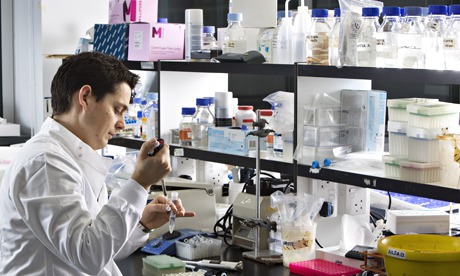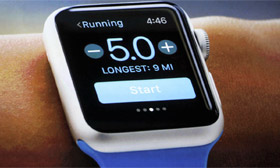Scotland's top universities are bracing themselves for a brain drain of their most talented scientists if there is a yes vote for independence, with some academics already prepared to relocate.
Senior academics and university executives told the Guardian they believed Scotland's best-known universities would lose access to billions of pounds in funding and joint projects supported by British research councils if the country voted to leave the UK.
A number of senior research scientists have already been approached by leading English universities because of the referendum, while some candidates are delaying taking up Scottish posts until after the vote, sources have disclosed.
Researchers have warned their departments they are likely to leave after a yes vote because they fear deep education spending cuts will follow independence, threatening an exodus which is understood to be causing deep anxiety for the country's university administrators.
Prof Richard Cogdell, director of the Institute of Molecular, Cell and Systems Biology at the University of Glasgow, said: "I have had contact with staff who have said 'if it's a yes vote, then I would be looking to leave.'"
Among the subjects most at risk, academics said, were highly prized areas such as advanced computing and informatics; genetic and biomedical research; animal sciences; theoretical physics; and Scotland's role in multinational projects.
Prof David Weller, director of the Centre for Population Health Sciences at the University of Edinburgh, said 80% of his centre's work was in collaboration with other UK researchers and cancer charities. "There's just no way if Scotland was a separate country that kind of arrangement could be sustained. There are huge concerns in the area I work in," Weller said.
One of Scotland's leading biomedical experts, Prof Jim Naismith, head of the biomedical sciences research complex at St Andrew's University, said: "There will a drift away [of expertise]. It will start slowly but there will be a clear drift. It's not just the people who leave, we won't be able to bring people in from outside."
A source close to Mike Russell, the Scottish education secretary, said the academics' concerns were misplaced. "We have already made clear that in all circumstances we will guarantee that research funding is maintained during and after Scotland's transition to independence," he said.
The warnings came as Alex Salmond, the first minister, said there was likely to be a record turnout in the referendum on 18 September. He told Sky News there had been a groundswell of voters registering for the first time before the closing date for voting on Tuesday. "This is the most empowering story in Scotland's history," Salmond said.
Scotland has a separate universities system to the rest of the UK and day-to-day costs and student fees are funded largely by the Scottish government. But that is disregarded by the research councils, which run a wholly integrated system at UK level to award funding and research contracts.
Scottish universities attract about 12% of all the UK's £2bn-a-year research council grants and project funding, well above its 8.9% population share. For Edinburgh University, that means roughly 30% of its external funding comes from UK sources.
The anti-independence group Academics Together, which has more than 100 members, insist the system allows them to compete at a global level, helping Scotland's research sector to employ 32,000 research professionals – a higher number per head than in the UK as a whole.
Research Councils UK (RCUK), the umbrella body for seven research councils covering areas such as biotechnology, engineering, medical research, physics and economics, said that research funding "is just one of many issues that are extremely uncertain" if Scotland became independent.
"This uncertainty is not good for Scotland," it said, warning that a smaller research pool after independence would undermine its global standing. Echoing the UK government's support for a no vote, RCUK stated "We believe Scotland is better off as part of the UK and that the UK is stronger with Scotland within it."
The pro-independence group Academics for Yes claim that Scotland's total income from UK research councils has been on average only £28m a year more than a pro rata share of Scotland's tax contribution to the UK, because RCUK spent far more on major capital projects in England than Scotland.
The Scottish government says that after independence it and the UK government should set up a new "common research area", to closely mirror the current RCUK system. It would be in the UK's interests because of Scotland's significant contribution to important areas of science.
Scottish ministers would help fund a new common research area based on population share, but would also want to influence its projects and funding to ensure "Scottish interests be better and more consistently reflected".Dr Steven Watson, a mathematician at the University of Glasgow and a co-founder of Academics for Yes, said closing that gap would be affordable after independence, but research had now become a "political football".
The UK already collaborated in the cross-border scientific funding system run by the EU. "The UK certainly doesn't have any barrier to dealing with the EU, why wouldn't the UK choose to do that with a nation [Scotland] which is far closer and has far more affinity with," he said.
























